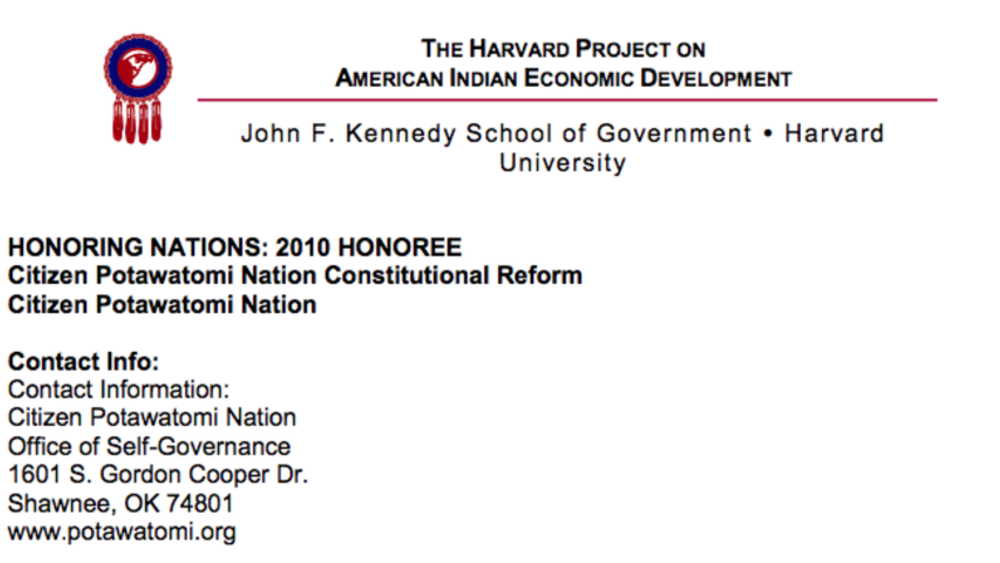Professor Joseph P. Kalt describes the dramatic rebirth of the Citizen Potawatomi Nation, citing its development of capable governance as the key to its economic development success.
Additional Information
Kalt, Joseph P. "Constitutions: Critical Components of Native Nation Building." Native Nations Institute for Leadership, Management, and Policy. University of Arizona. Tucson, Arizona. 2012. Lecture.
Transcript
“I’ll tell just one story about constitutional reform. On the left, you see a picture of basically the entirety of the Citizen Potawatomi Nation of Oklahoma in the mid-1970s. This tribe -, well-documented -- in the mid 1970s, this tribe had two-and-a-half acres of land, 550 dollars in the bank, and that house trailer. That’s their tribal headquarters. Some tribal members that have been out there said they remember their parents talking about, ‘The house trailer is the boxing ring,’ because there would be cycles of impeachment where the tribal chairs would be impeached or removed from office. And the new guys coming in would come in and have to physically fight to get the old guys out. And they tell a famous story , they’re proud of this story in a certain way because of what I’ll put up on the right in a second. They tell a famous story, that house trailer, one of the impeached chairs of the tribe, his son is at the front door of the house trailer, ‘Dad! They're coming to kick us out!’ So dad’s afraid of getting beat up, and he kicks the side out of that house trailer and jumps in one of those cars. And Citizen Potawatomi points out that those are the three worst cars ever built. It’s a Ford Pinto, a Gremlin, and a Dodge Dart.
And today, Citizen Potawatomi Nation basically owns Shawnee, Oklahoma. They are not only the economic engine, they are the political engine of their region of Oklahoma. And just recently, in what may be one of the most striking instances of the effective assertion of tribal sovereignty, a local town, non-Indian town has opted into the Citizen Potawatomi Nation’s court system. This is like real sovereignty when somebody says, ‘I want to be under your system of government and your court system.’ Well, this is a fascinating development. And part of story is well, how did it happen? And time and time again where you see these dramatic turnarounds, Citizen Potawatomi on the left mid-1970s, today Citizen Potawatomi Nation, engine of Shawnee, Oklahoma economically, politically, socially. They’ve taken a community -- these are Okies -- in the 1930s, this community was scattered like so many other people in Oklahoma. Consequently, they have Potawatomis all over in places you can associate with the Dust Bowl effects: Bakersfield, California; Fresno, California; Sacramento; Phoenix; other places. They now run tribal council meetings essentially with simultaneous big-screen TVs in multiple communities, and they’re building sub-headquarters, essentially. I think they’re trying to buy land in Phoenix right now to build one. I believe they’ve opened one in Bakersfield or Fresno, Sacramento, something like that. They basically used their development prowess to bring the community back together. How do they do it? Well, it's very interesting. The story they tell, and so many tribes with these dramatic turnarounds tell this story. I can’t tell you how many times , you’ve heard these famous cases of economic development: Mississippi Choctaw, Mescalero Apache, some of these places in the 1980s that started to break the patterns of poverty and dependency. And we go -- twenty years ago when I had more hair, I’d go out and interview some of these tribal chairs. ‘What’d you do to turn things around?' And I’d expect them to tell me stories about business. No. Almost invariably, they tell me a story, ‘We changed our constitution. We changed our constitution.’ There's a link here, a strong link, between economic development and constitutions. Turns out, economic development and the curing of so many of the social ills that come along with poverty, dependency and so forth -- economic development is fundamentally a challenge of governance, not resources. I go out and I go to conferences in Indian Country all the time and I keep hearing, ‘Oh, we need more resources and better training.’ It’s true, resources and training are useful; but if you can’t govern yourselves, everything falls apart."

